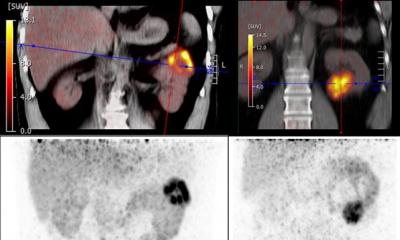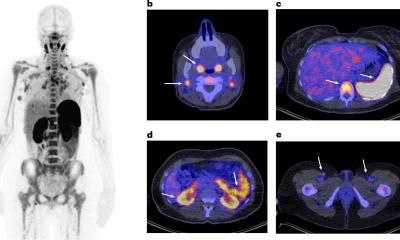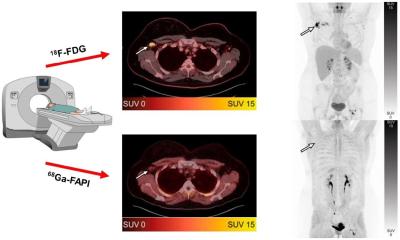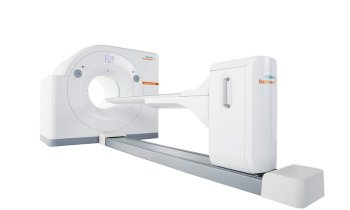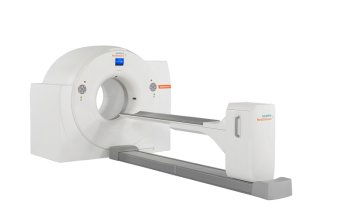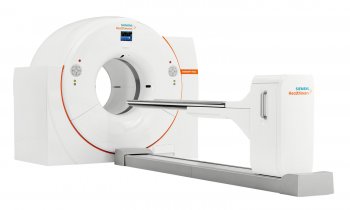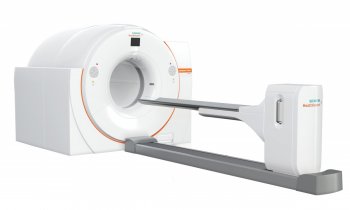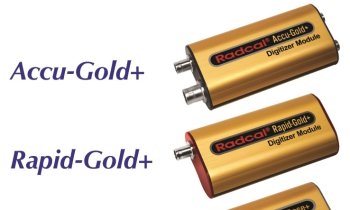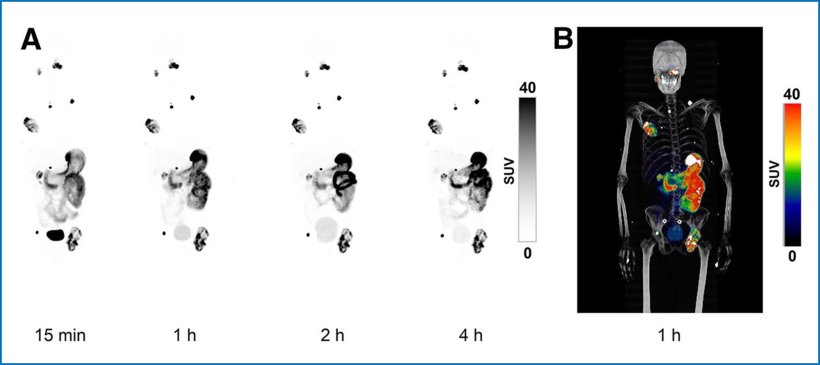
Whole-body maximum-intensity projections over time after [68Ga]Ga-DPI-4452 administration. (A) Representative PET images at 4 post-administration time points. (B) PET/CT image at 1 h to allow visualization of anatomic contour.
Image source: Hofman MS et al., Journal of Nuclear Medicine 2024 (CC BY 4.0)
News • Clear cell renal cell cancer
Same-day imaging for ccRCC kidney cancer with new PET agent
A novel investigational PET imaging agent can rapidly and accurately visualize lesions in clear cell renal cell cancer (ccRCC) patients, according to new research.
The results of the study published in the Journal of Nuclear Medicine suggest that the agent 68Ga-DPI-4452 (Debio 0328) is superior to standard CT imaging in the context of ccRCC. It also allows for significantly faster imaging and, in the future, could be utilized as part of a theranostic pair. ccRCC accounts for 70-80% of renal cell carcinoma cases. Localized disease can be cured with surgery and ablative therapy regimens; however, one-third of patients present with or develop metastases, with poor prognosis. Despite major advances in treatment for renal cell carcinoma, the five-year relative survival rate for distant metastatic disease remains low.
“The carbonic anhydrase IX (CAIX) encoding gene is overexpressed in more than 90% of ccRCC cases and is restricted to gastrointestinal tissue, presenting both diagnostic and therapeutic opportunities” said Professor Michael Hofman MBBS, FRACP, FAANMS, nuclear medicine specialist at the Peter MacCallum Cancer Centre in Melbourne, Australia. “In this study, we aim to assess the safety, tolerability, and imaging characteristics of the CAIX-targeting imaging agent 68Ga-DPI-4452 (Debio 0328).”
One-hour after administration was deemed the optimal time point for lesion assessment, which is substantially shorter than the three to seven days needed in previous PET imaging studies using antibody approaches
Michael Hofman
This ongoing first-in-human GaLuCi study included three patients with histologically confirmed unresectable locally advanced or metastatic ccRCC who had received at least two lines of treatment in a metastatic setting. Patients received 68Ga-DPI-4452 (Debio 0328) and underwent whole-body PET/CT at 15 minutes, and one, two, and four hours after administration. Images from these three initial patients were analyzed, and pharmacokinetics and safety data were assessed.
68Ga-DPI-4452 (Debio 0328) offered outstanding imaging from the earliest time point with sustained tumor uptake up to four hours after administration. The agent was rapidly eliminated from the blood and urine, and no clinically significant toxicity was noted among the patients. “68Ga-DPI-4452 PET/CT revealed an exceptionally high tumor-to-background ratio, with background tissues nearly invisible with the exception of gastro-intestinal uptake. One-hour after administration was deemed the optimal time point for lesion assessment, which is substantially shorter than the three to seven days needed in previous PET imaging studies using antibody approaches,” said Hofman. “Further work is now needed to assess whether this new imaging test could improve patient diagnosis, management, and outcomes. These findings are also encouraging for the evaluation of 177Lu-DPI-4452 (Debio 0228) as a treatment for ccRCC, which will be examined in the second arm of GaLuCi study.”
Source: Society of Nuclear Medicine and Molecular Imaging
10.05.2024



